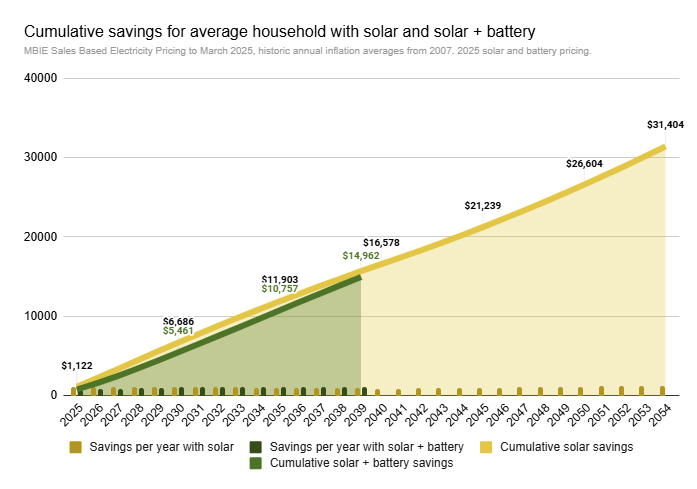The case for energy loans: read our latest explainer



Solar and batteries - in homes and EVs - offer signicant resilience benefits during times of crisis and the Ratepayer Assistance Scheme can help unlock private investment.
Rewiring Aotearoa is an independent non-partisan non-profit, funded by New Zealand philanthropy. It is a registered charity working on energy, climate, and electrification research, advocacy, and supporting communities through the energy transition. The team consists of New Zealand energy, policy, and community outreach experts who have demonstrated experience both locally and internationally. We’re always fighting for the New Zealanders who use the energy system, and our goal is to help build a low cost, low emissions, high resilience electrified economy for Aotearoa NZ.
Recognition of the resilience benefits of battery storage
Rewiring Aotearoa welcomes the recognition of battery storage’s resilience benefits, but we note that smaller local battery storage systems such as in homes could deliver significant advantages and be deployed more quickly.
This resilience, though hard to quantify in dollars, offers significant value in times of crisis. This enables food to be kept chilled/frozen and cooked, communication (when paired with Starlink and similar) and, importantly, reduces the demand on emergency and medical services to support households that are medically dependent on electricity (such as for home dialysis and breathing support).
In particular, supporting adoption of vehicle to grid (V2G) technology in households would be a fiscally prudent way to rapidly deliver resilience for emergency situations.
Schools as Community Emergency Hubs
Investing in solar combined with battery storage at schools significantly enhances community resilience - especially when they act as Community Emergency Hubs. While solar alone can reduce everyday energy costs (which reduces Government spending on electricity for schools), pairing it with battery storage ensures these schools remain powered during grid outages, enabling them to serve as safe emergency shelters with lighting, communications, heating, and refrigeration when communities need them most.
Facilitating vehicle charging of cellphone towers
Facilitating vehicle-to-X charging for cellphone towers is critical to keeping communities connected during emergencies. At present, we understand that these towers only have around eight hours of backup battery power, leaving a significant gap if outages last longer. Enabling safe charging from electric vehicles or mobile battery units would extend tower operation, ensuring vital communication lines remain open so people can access information, reach loved ones, and support emergency response.
The Ratepayers Assistance Scheme can unlock private financing
In terms of financing, the rapid and widespread adoption of solar and battery storage systems to provide this resilience benefit could be enabled through the Ratepayers Assistance Scheme (RAS). A modest equity investment from central government and similar investments from local councils, would unlock access to billions of dollars of low cost private lending for New Zealand households to invest in these systems, without adding to Crown or Local Government debt.
These loans can unlock significant savings for households alongside local energy resilience benefits. The figure below shows an average household could save almost $15,000 over 15 years by investing in a 9kW solar and 10kWh battery system (green line). This takes account of the savings a household would make from avoided electricity bills and value gained from exports back to the grid, and subtracts the cost of financing the cost of solar at 5.5% interest over a 15 year term.

Solar alone typically provides greater savings than a system with both solar and batteries due to the higher upfront costs of batteries. Yet batteries add critical value. They provide important private and public resilience benefits, including backup during outages and reduced grid demand at peak times.
The public benefits justify government spending
The public benefit of this private investment also provides a reason why central government should provide a short-term financial incentive, such as a subsidy, to promote rapid uptake and rollout of these systems. New Zealand could look to Australia’s recently adopted Cheaper Home Batteries Programme. This programme offers households, small businesses, and community organisations an upfront discount of ~30% on the cost of installing small-scale battery systems when paired with new or existing solar installations. The discount will gradually decrease until 2030, as battery prices decline.
Invest in our schools as Community Emergency Hubs
The Community Renewable Energy Fund (CREF), administered by EECA, already supports installations of solar panels and batteries on community buildings - including schools - to drive both energy resilience and cost savings. By expanding this successful programme to include more schools across Aotearoa, government and local partners can transform educational facilities into dependable energy hubs - empowering them to support both daily needs and emergency response efforts within their communities.

Rewiring Aotearoa is in favour of universal Road User Charges as we believe it will address an artificial market distortion for vehicles that is not in New Zealand’s economic, fuel security, or resilience interests. Here's what we told the Select Committee.
Read moreDownload
The story of Uruguay's renewable push and why it's relevant here; EVs reach a tipping point in the EU, but they're growing in developing nations, too; Tauranga Crossing and Endless Energy go vertical with a new solar install; new research shows panels keep on trucking far past their warranty periods; and if you need a hand getting out on the waves, how about getting your own electric towing machine.
Read moreDownload
Our Political Power series aims to show that going electric is good for everyone, no matter where you sit on the political sprectrum. Whether you're looking to lower costs, reduce emissions or increase resilience, it increasingly makes sense at an individual, community and country level and ACT's Todd Stephenson, who bought an electric Jeep around one year ago and built his new home in Queenstown to run on electrons, is a good example of that.
Read moreDownload